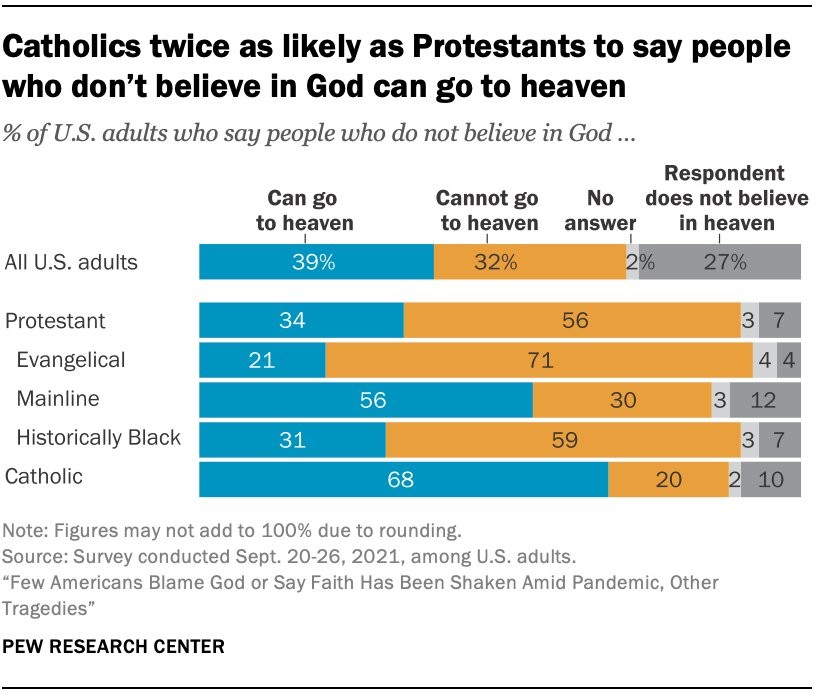New Pew study looks at views on theodicy, afterlife

In September, the Pew Research Center dug into the views adults in the United States hold on theodicy (why do bad things happen to good people?), as well as their views on the reality of heaven and hell and how one gets to either destination.
While most of the questions produced clear majority views within the American populace, detailed analysis reveals deep differences.
For example, 33 percent of American adults—including 30 percent of those who identify as Christian—believe in reincarnation. No major branch of Christianity teaches reincarnation.
Those most likely to express belief in reincarnation were Black Protestants (48 percent) and Hispanic Catholics (47 percent). Overall, younger adults are more likely than older adults to believe in reincarnation.
The heart of the new study, however, probes views on why bad things happen in the world. The Pew research takes on this age-old question from various angles. The combined results show that Americans are deeply conflicted on these questions and sometimes hold seemingly contradictory views.
When asked which of four options best explains why suffering exists, 44 percent chose “sometimes bad things just happen,” while 22 percent chose “suffering is mostly a consequence of people’s own actions,” 19 percent chose “suffering is mostly a result of the way society is structured,” and 19 percent chose “to provide an opportunity for people to come out stronger.”
Read our latest issue or browse back issues.
Yet when asked separately what they see as the source of most suffering in the world, 80 percent of Americans identified “the actions of people” rather than actions by God as the source. Evangelicals and Catholics are the most likely (both 90 percent) to say this.
In contrast, multiple other studies have found evangelical Christians among those least likely to believe that human action causes climate change or that people can be responsible for systemic racism.
Almost all adults who identify as Christian (92 percent) believe in some concept of heaven. And more Americans believe in heaven than believe in hell.
Evangelicals topped the charts on belief in a literal hell, Pew found, with 91 percent affirming this idea. Nationwide, only 62 percent of Americans believe in a literal hell. Pew also found that Black Christians and Republicans are among the most likely to believe in hell.
Mainline Protestants (69 percent) are the least likely among Christian groups to believe in hell. Also of note: women (65 percent) are slightly more likely than men (59 percent) to believe in hell.
Pew found that 26 percent of agnostics say they believe in heaven and 14 percent believe in hell. Among those who claim to be “nothing in particular”—the much-heralded nones—fully half (50 percent) believe in heaven and more than a third (39 percent) believe in hell.
More than a third (39 percent) of Americans are sure that those who do not believe in God can go to heaven. Perhaps not surprisingly, evangelicals lead the pack (71 percent) in insisting that those who do not believe in God cannot go to heaven.
Among American Christians, Catholics (68 percent) are the most likely to say those who do not believe in God may be admitted to heaven, while only 20 percent of Catholics say the unbelieving cannot get to heaven.
A separate question asked respondents about which religions they believe can lead someone to heaven. Based on Pew’s findings, 58 percent of American Christian adults believe “many religions can lead to eternal life in heaven.” Forty-four percent of evangelical Christians believe other religions can lead to heaven while 19 percent believe only Christianity leads to heaven.
Among all US Christians, Catholics (72 percent) and mainline Protestants (67 percent) are the most likely to say “many religions” may lead to heaven.
Evangelicals are by far the most likely (50 percent) to say their religion “is the one true faith leading to eternal life in heaven.” That is more than double the percentage of mainline Protestants and triple the percentage of Catholics who say the same. —Baptist News Global






